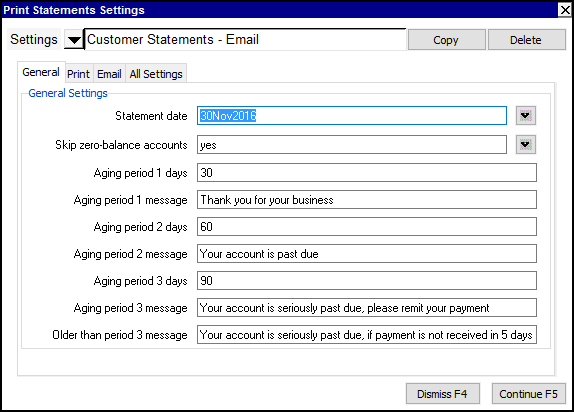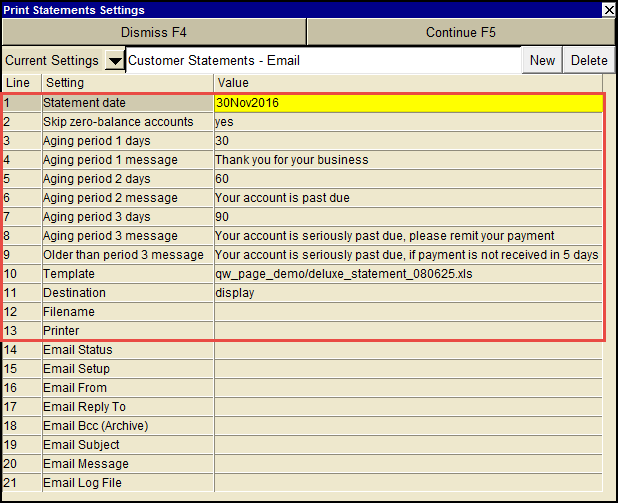On an account table, activate the account for which a customer/vendor statement is to be printed. If you want to print ledgers for more than one account, use the Block>Start and Block>End commands to mark the accounts in a block.
Issue the Print>Statement command and fill out the prompt as follows:


| Print Statements Settings | |||
| Line | Field | Comments | |
| 1 | Statement Date | The date on which the statement was printed. | |
| 2 | Skip zero-balance accounts | This will notify the system if it should skip any zero balance accounts when processing the statements. | |
| 3, 5, 7 | Aging period 1, 2 and 3 days | Up to 4 aging period totals can be printed on a statement. They are typically used to print the totals of the outstanding invoices for ranges such as 0 - 30 days, 31 - to 60 days, 61 - 90 days and 90+ days. The three aging periods can be set to define any intervals you wish. The fourth aging period is used for items that are older than the third aging periods. | |
| 4 | Aging period 1 message | This is the message that will be printed on the statement if all outstanding invoices are within the first aging period. | |
| 6 | Aging period 2 message | This is the message that will be printed on the statement if all outstanding invoices fall within the first two aging periods. | |
| 8 | Aging period 3 message | This is the message that will be printed on the statement if all outstanding invoices fall within the first three aging periods. | |
| 9 | Older than period 3 message | This is the message that will be printed on the statement if all outstanding invoices that are older than the third aging period. | |
| 10 | Template | The template to be used to print the statement(s). Press <F3> to select the template from an explorer (double click to select). Statement templates supplied with NV2 contain the words "statement" in their names. For example, "safeguard_invoice_00875.xls". | |
| 11 | Destination | display file printer | display - exports to Excel and opens Excel for a preview. email - creates an email file for attachment. file - sends output to the file specified in Filename. printer - sends output to the printer identified by Printer. |
| 12 | Filename | The output file name. The file type must be {".xls"}, {".xlt"} or {".pdf"}. Important see note on Output File Names options. | |
| 13 | Printer | If Destination is printer then output is sent to the printer specified here. If this field is empty then output will be sent to the Windows default printer. Press <F3> to select from a list of available printers. NOTE: To clear the Printer field Press <F3> to select from the list of printers, and click on <Cancel> | |
| 14 - 21 | Email | See email Print Settings for more. | |
Click the Continue button at the top of the settings window to print the statements.